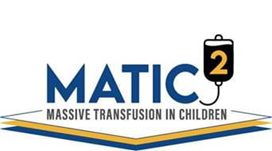 By Cristina D’Imperio
By Cristina D’Imperio
“Pediatric trauma research is decades behind research in adults,” maintains Christine Leeper, MD, Assistant Professor of Surgery and Critical Care Medicine at the University of Pittsburgh.
Trauma is the leading cause of death in children in the U.S., with most deaths occurring within 24 hours of injury. In comparison to adult trauma patients, children are more likely to die in the emergency room than survive long enough to be either admitted into the hospital or transferred to the operating room.
“Not only is trauma the leading cause of death in kids,” states Philip Spinella, MD, “their mortality rate with life-threatening bleeding is almost twice that of adults. And we think that’s because of delay in recognition and treatment, not that children are less resilient.”
Dr. Spinella, who is McGowan affiliated faculty and Co-Director of the Trauma and Transfusion Medicine Research Center, alongside Dr. Leeper and Angelo D’Alessandro, PhD, Professor of Biochemistry and Molecular Genetics at the University of Colorado, is launching a clinical trial to test, simultaneously, multiple interventions for life-threatening bleeding in children.
The trial, Massive Transfusion in Children-II (MATIC-II) will be the first randomized “platform” trial of its kind to assess traumatically injured children. Platform trials test multiple therapies at once, whereas more typical trials assess only one intervention. This will enable researchers to assess the safety and effectiveness of treatments based on data collected during the trial, further allowing the researchers to add or remove treatments in order to provide the best outcomes for patients.
 The MATIC-II platform trial will study blood transfusions in pediatric patients. When blood is donated, it is usually separated into red blood cells, platelets, and plasma. Many patients who experience substantial bleeding require all three. Recent research indicates that “whole” blood, rather than blood that has been separated, may improve survival and reduce the amount of overall blood needed by patients.
The MATIC-II platform trial will study blood transfusions in pediatric patients. When blood is donated, it is usually separated into red blood cells, platelets, and plasma. Many patients who experience substantial bleeding require all three. Recent research indicates that “whole” blood, rather than blood that has been separated, may improve survival and reduce the amount of overall blood needed by patients.
MATIC-II will study the safety and effectiveness of several different types of whole blood transfusions in 1,000 traumatically injured children across 20 U.S. pediatric trauma centers. The study is funded by the Biomedical Advanced Research and Development Authority, part of the Administration for Strategic Preparedness and Response within the U.S. Department of Health & Human Service. It currently has a budget of $34 million for the first five years, with the potential for funding to increase to more than $81 million.
Looking to the near future with optimism, Dr. Spinella upholds, “This trial will be transformative when it comes to trauma care for children.”
Read more from the Pittsburgh Business Times here.
Find the story on UPMC here.
